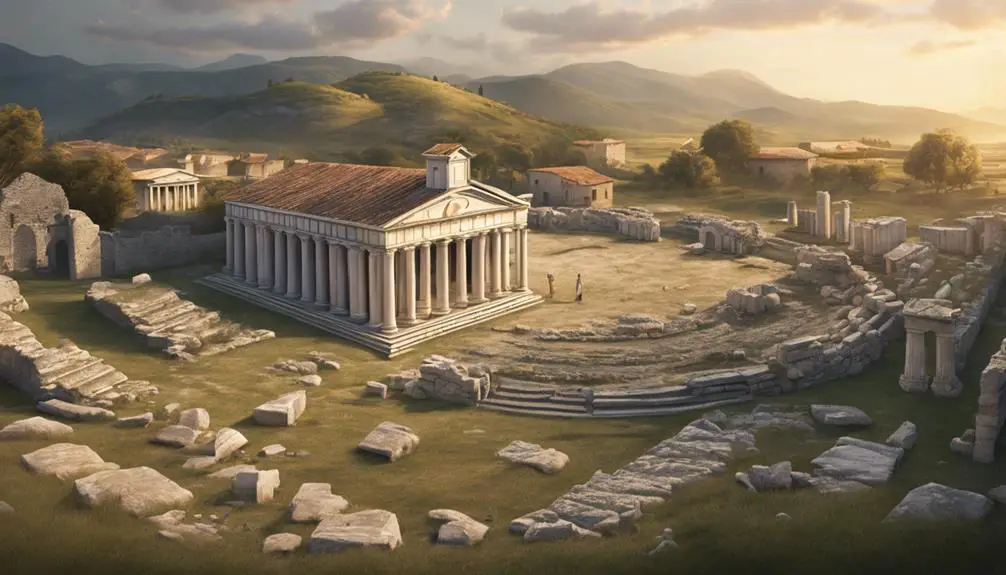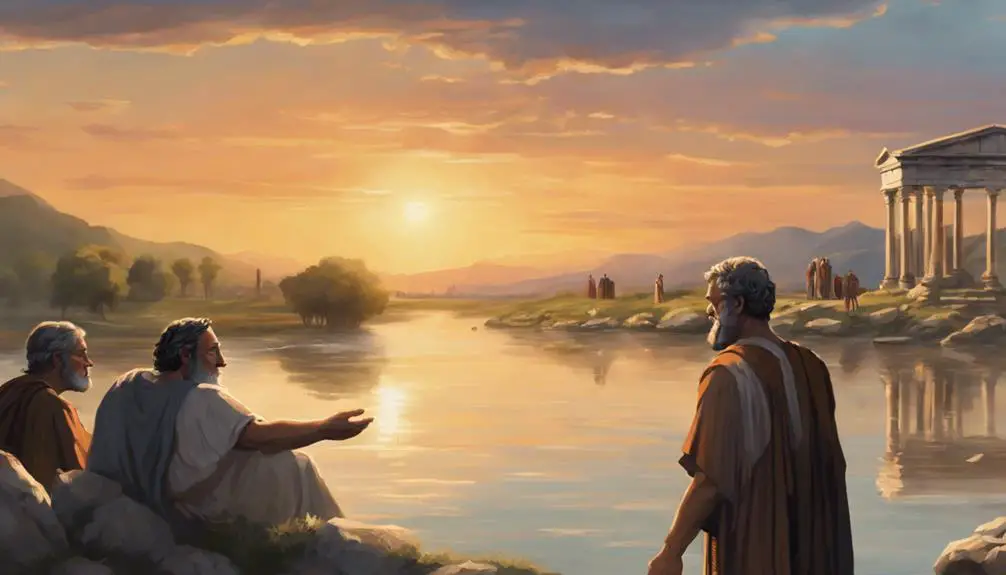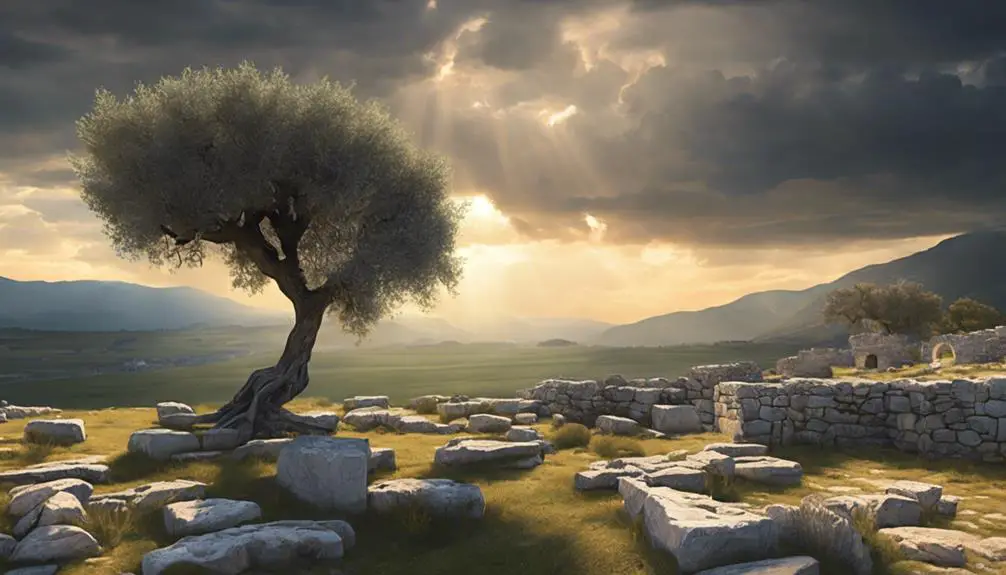Navigate the origins and trials of the early Church of Philippi, uncovering a tale of faith and resilience that still inspires today.

Church of Philippi in the Bible
When Paul first set foot in Philippi, he encountered Lydia, a seller of purple goods, whose heart the Lord opened to heed Paul's message. This pivotal moment marks not just the beginning of the Church at Philippi but also signifies the spread of Christianity in Europe.
As you explore the historical background, Paul's ministry, and the key themes within his letter to the Philippians, you'll uncover how challenges were met with perseverance, shaping the legacy and impact of this early Christian community.
What unfolds is a story of faith, unity, and joy amidst adversity, inviting you to consider its relevance today.
Key Takeaways
- Philippi was a strategic Roman colony, pivotal for early Christian missionary work by Paul and Silas.
- The Church of Philippi exemplified unity and humility, essential themes in the Epistle to the Philippians.
- External opposition and internal disputes challenged the church, yet it stood as a testament to faith and resilience.
- The legacy of Philippi's church continues to inspire modern believers in overcoming trials with grace and community strength.
Historical Background

Nestled in the heart of Macedonia, Philippi's historical significance stems from its biblical connections and strategic placement along the ancient Roman road, the Via Egnatia. You'll find that its inception as a city dates back to its Macedonian founding, which laid the groundwork for its rich cultural and political history. The area was initially recognized for its fertile plains and natural resources, making it a coveted location long before its prominence in biblical narratives.
Philippi's transformation into a significant urban center, however, was marked by its establishment as a Roman colony. This pivotal event occurred following the Battle of Philippi in 42 BCE, wherein Octavian and Mark Antony's victory over Brutus and Cassius, the assassins of Julius Caesar, led to a reconfiguration of Roman power dynamics. In the aftermath, the city was repopulated with veterans of the Roman army, a common practice designed to secure loyalty and extend Rome's influence in strategic regions.
As a Roman colony, Philippi enjoyed various privileges, including autonomy in local governance and exemption from certain taxes. The city's infrastructure, including the Via Egnatia, was developed to facilitate trade, military movements, and cultural exchange across the empire. This road, in particular, played a crucial role in the spread of ideas, goods, and people, connecting Philippi directly to the heart of Rome and beyond.
The city's status as a Roman colony and its location on a major trade route contributed significantly to its prosperity and cosmopolitan character. It's within this historical and geopolitical context that Philippi emerges as a critical backdrop for the events and narratives recounted in the New Testament.
Paul's Arrival and Ministry

Amidst its rich historical tapestry, Philippi became the focal point of Paul's missionary journey, profoundly impacting the spread of Christianity in the region. Upon your arrival in Philippi, you'd find that Paul, along with Silas, strategically initiated their ministry in this cosmopolitan city, recognizing its significance as a Roman colony and its strategic location on the Via Egnatia.
Your analysis of Silas's role reveals a partnership marked by resilience and dedication. Acting as Paul's right-hand man, Silas's contributions were instrumental in the establishment and strengthening of the early church in Philippi. Together, they faced imprisonment, which didn't deter their mission but rather amplified their influence, leading to the miraculous conversion of the jailer and his household.
You'll observe that Lydia's conversion is another pivotal moment in Paul's ministry in Philippi. As a wealthy businesswoman dealing in purple cloth, Lydia's heart was opened by the Lord to heed Paul's message. Her baptism and that of her household marked the inception of the church in Philippi, with her home likely serving as the initial gathering place for believers.
Key Event |
Impact on Philippi's Church |
|---|---|
Arrival of Paul and Silas |
Initiated the spread of Christianity |
Imprisonment |
Strengthened the believers' resolve |
Lydia's conversion |
Marked the beginning of the church |
Jailor's conversion |
Expanded the church's social diversity |
Establishment of a meeting place |
Provided a center for worship and fellowship |
This strategic and divinely guided approach underscored the importance of Philippi in the expansion of Christianity, showcasing the early church's resilience and adaptability.
Key Themes in Philippians

Several key themes permeate the Epistle to the Philippians, each offering profound insights into Paul's theological perspective and his intimate relationship with the Philippian church. At the heart of this letter, you'll find the compelling calls to joyful unity and Christian humility, themes that not only underscored the early Christian experience but also resonate with believers today.
Joyful unity emerges as a central pillar within Philippians. Paul emphasizes this theme through his repeated calls for the church members to stand firm in one spirit, striving side by side for the faith of the gospel. This isn't merely about agreement on doctrinal points; it's about fostering a community where love, understanding, and mutual support thrive. You're encouraged to consider how your relationships reflect this spirit of unity, and how you contribute to a supportive community that echoes the unity Paul envisioned.
Christian humility is another dominant theme, intricately woven through Paul's discourse. It's most vividly illustrated in the Christ Hymn (Philippians 2:5-11), where Jesus' incarnation and subsequent death on a cross serve as the ultimate model of humility and self-sacrifice. This passage isn't simply historical recounting; it's a call to action. You're invited to embody this humility in your interactions, prioritizing others' needs and embracing service over self-interest.
Together, these themes challenge you to reflect on your personal journey and the ways in which you embody joyful unity and Christian humility. Paul's letter to the Philippians serves not only as a historical document but as a living, breathing guide for cultivating a life marked by these virtues.
Challenges and Perseverance

While exploring the themes of joyful unity and Christian humility in Philippians, it's crucial to also understand the backdrop of challenges and perseverance that shaped the early church's journey. This context not only illuminates the epistle's messages but also offers valuable lessons on modern resilience and spiritual growth.
The early Church of Philippi faced several formidable obstacles:
- External Opposition: They contended with hostility from both the Roman authorities and segments of the local population, who were suspicious of their new faith and practices.
- Economic Hardship: Many members experienced economic disadvantages due to their Christian commitment, which often led to social ostracization and financial hardship.
- Internal Disputes: The church wasn't immune to internal conflicts, as differing views on theology and practice threatened to divide the community.
- Geographical Isolation: Located far from other Christian communities, the Philippians often faced feelings of isolation and abandonment, making the maintenance of faith and unity even more challenging.
These trials, however, weren't merely obstacles but catalysts for spiritual growth and the strengthening of the community's resilience. The church's ability to persevere through adversity, inspired by Paul's letters, serves as a testament to the power of faith and the importance of supportive community ties. This historical example provides a blueprint for modern believers on how to navigate challenges with grace and fortitude, fostering an environment where spiritual growth is cultivated through trials.
Legacy and Impact

How has the Church of Philippi's resilience in the face of adversity left a lasting impact on Christian communities today? This question probes deep into the historical and spiritual legacy of a congregation that thrived amidst trials. The Church of Philippi, as chronicled in the Bible, provides a blueprint for faith, unity, and perseverance that resonates profoundly with modern Christian groups.
You'll find that the Church of Philippi's journey mirrors current challenges faced by many believers. Modern parallels are evident in how today's churches navigate societal pressures, internal divisions, and external hostility, yet strive to remain faithful to their core beliefs and missions. The steadfastness of the Philippian church inspires contemporary believers to hold firm to their faith amidst trials, underscoring the timeless relevance of their example.
Furthermore, the ecumenical influence of the Church of Philippi can't be overstated. Its legacy is a testament to the power of unity in diversity within the Christian faith. The church's acceptance of diverse members, including a wealthy businesswoman, a slave girl, and a Roman jailer, showcases an early model of inclusivity and ecumenical fellowship. This aspect of the Philippian church's story encourages today's Christian communities to embrace diversity and foster unity, highlighting the ecumenical potential inherent in the Christian faith.
Frequently Asked Questions
How Has Modern Archaeology Contributed to Our Understanding of the Church of Philippi's Structure and Daily Life?
Modern archaeology's artifact discovery and advanced excavation techniques have significantly deepened your understanding of the structure and daily life of ancient communities.
Through carefully analyzing unearthed objects and employing innovative methods, you've gained insights into the architectural layout, social hierarchies, and everyday activities.
This approach has illuminated the complexities of historical societies, revealing a detailed picture of their existence that textbooks alone couldn't provide.
Are There Specific Liturgical Traditions or Practices That Can Be Traced Back Directly to the Church of Philippi?
You're diving into whether specific liturgical traditions stem from early Christian communities. While it's challenging to link modern practices directly back, Paul's Letters provide clues.
These writings suggest early forms of liturgical music and communal worship that have influenced today's traditions. Analyzing these texts, you uncover roots of current liturgical practices, showing how ancient customs, possibly from communities like Philippi, have evolved into the rich, complex rituals experienced in churches worldwide.
How Did the Geographical Location of Philippi Influence the Spread of Christianity in the Surrounding Regions During the Early Church Period?
You'll find that Philippi's strategic location and the Roman roads played a crucial role in spreading Christianity.
Situated on major trade routes, it became a hub for early Christian missionaries.
The well-developed Roman roads facilitated travel and communication, allowing for quicker dissemination of Christian teachings.
This strategic position not only contributed to the growth of Christianity in nearby regions but also significantly influenced its expansion throughout the Roman Empire.
What Role Did Women Play in the Congregation and Leadership of the Early Church of Philippi?
In the tapestry of early congregations, women weren't just threads woven in the background; they were vibrant colors shaping the pattern. Female discipleship and leadership roles were pivotal, especially in communities like Philippi's. These women didn't just follow; they led, taught, and nurtured the fledgling faith.
Analyzing their contributions, it's clear they were cornerstone figures, ensuring the faith's spread and the congregation's cohesion through their unparalleled commitment and spiritual guidance.
Can Any Contemporary Christian Denominations Directly Trace Their Origins or Theological Emphases to the Church of Philippi?
You're diving into a complex topic.
No contemporary Christian denominations can directly trace their origins or theological emphases back to Philippi's early church. Despite its significant role in Paul's travels and influencing Philippi's economy, the direct lineage is murky.
The evolution of church practices and beliefs over centuries means connections are more thematic or inspirational rather than organizational. However, Paul's epistles to Philippi remain influential in shaping Christian thought and practice today.
Conclusion
As you've journeyed through the story of the Church of Philippi, you've uncovered the resilient spirit that defined Paul's ministry and the early Christian community. Imagine standing amidst ancient ruins, feeling the whispers of perseverance and faith that echo through time. The legacy of Philippi, woven with themes of joy amidst suffering and unity in diversity, continues to inspire.
Analyzing this narrative, it's clear that the Church's impact transcends time, offering timeless lessons on resilience, community, and the power of faith.



Sign up